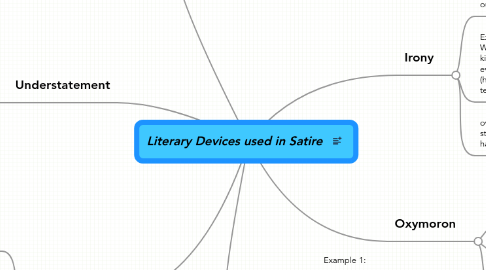
1. Hyperbole
1.1. Example 1: Chapter 11, pg.25 In the old woman's story, she says that one of her robes was worth more than all the assembled magnificence of Westphalia.
1.1.1. I think this is a hyperbole, because just like the quote 'I'm so hungry I could eat a horse', the robe being worth more than the magnificence of Westphalia is an exaggeration in description.
1.2. Example 2:
1.3. own definition: when the author uses too much expression, when he/she exaggerates something that does not have to be
2. Parody
2.1. Example 1:
2.2. Example 2:
2.3. own definition: an imitation of style of another writer
3. Allusion
3.1. Example 1: Chapter 15, pg.38 In the last paragraph, there is a sentence where the readers are told that Cacambo has seen worse in his time.
3.1.1. It think this is an allusion because this phrases made me think about that those worse things could be. The book does not go deeply into it or explain at all, but it still made me think what kind of things they were that Cacambo had seen.
3.2. Example 2: Chapter 16, pg.41 In the third paragraph, Cacambo starts to talk in the Oreillon language, or also known as 'gibberish'.
3.2.1. It never was explained in the book but there seemed to be a lot of things that Cacambo was able to do. For example, always give good advice, know a certain place very well, and now he even speaks the unfamiliar Orellion language. How can Cacambo do all this? What has he been through before? The paragraph is thought-provoking, and therefore I think it is an allusion.
3.3. own definition: a thought provoking thing that makes the readers/audience think about something, but the text has not explained it explicitly
4. Understatement
4.1. Example 1: Chapter 16, pg.40 When Cacambo explains to Candide that the apes that Candide has just killed had been the girls' lovers
4.1.1. I think this is an understatement because even though Cacambo knows that this news may be shocking to Candide, Cacambo describes this case so simply, as if it wasn't a big deal. I think this new could have used a little bit more expression and detail.
4.1.1.1. This may satirize how people describe things the way they see it, with as much expression they see fit in using to describe the scene. For example, Cacambo explained the scene with a lack of expression, because to him this scene was not very shocking.
4.2. Example 2: Chapter 15, pg.38 When Cunégonde's brother has died.
4.2.1. This is the scene when Cunégonde, THE Cunégonde's own brother has been killed by none other than Candide. Candide has killed his lovely Cunégonde's brother, and I believe there should have been a greater, a more grand death. Since there wasn't and he died with two last sentences, I think this is an understatement.
4.2.1.1. I think this is satirizing how some people do not know that fact that death can come anytime anywhere, and that when someone is dead, that is just it. There is nothing left than a dead body, and so that is why people must be aware.
4.3. own definition: when something in particular is described with less explanation, detail or expressions
5. Irony
5.1. Example 1: Chapter 16, pg.40 When the monkeys that seemed to be a danger to the girls turn out to be their lovers
5.1.1. This is an irony because as one of the people who tend to think in one way, it was unexpected to have giant apes turn out to be human's lovers, not danger or terror
5.1.1.1. This is satirizing how people tend to think and view things in one way, instead of being open to other variables.
5.2. Example 2: Chapter 15, pg.38 When Candide suddenly ends up killing Cunégonde's brother when everything seemed to go so well (happy to see each other, crying tears of joy...etc.)
5.2.1. This is an irony because the first time I read this part, it was so unexpected and surprising for me. I thought everything was going fine and something good was about to happen because Candide and Cunégonde's brother were so happy to see each other. However quickly the situation changed and Candide killed the brother.
5.2.1.1. This is satirizing how people (for example, me in this case) do not expect the unexpected. I think it is also showing that it is always good to be ready or be aware of the fact that anything can happen anytime.
5.3. own definition: when something happens in the story, and it is not what the reader/audience has expected
6. Oxymoron
6.1. Example 1: Chapter 19, pg.51 The second sentence tells the readers that Candide thought he owned more treasure than Asia, Europe and Africa combined together.
6.1.1. This is an oxymoron because it is saying how Candide owns a lot of treasure, when the readers all know that Candide and the character do not own much.
6.1.1.1. This is satirizing how certain things and hope can change peoples' thoughts and actions very easily. This is not in all case really a bad thing, but I think Voltaire is trying to say that it is also not good to be too easily controlled.
